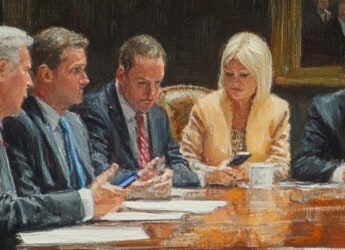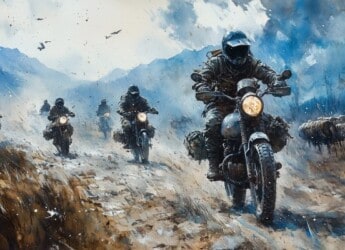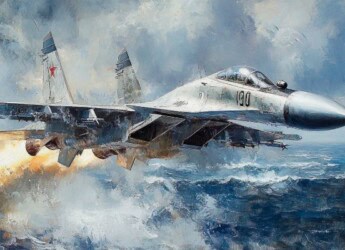|
|
Content Assessment: Dastardly Accolades? Russo-Ukrainian War Update (January 10 - 16, 2023)
Information - 93%
Insight - 92%
Relevance - 93%
Objectivity - 94%
Authority - 95%
93%
Excellent
A short percentage-based assessment of the qualitative benefit of the post highlighting the recent Ukraine conflict assessments in maps from the Institute for the Study of War.
Editor’s Note: The discipline of eDiscovery, which involves the identification, preservation, and analysis of electronic data, is increasingly being used in investigations and litigation relating to war crimes. In the case of the Russo-Ukrainian War, eDiscovery tools and techniques can be used to identify and collect electronic evidence of war crimes, such as emails, social media posts, and other digital communications that may provide valuable insights into the actions of individuals and organizations involved in the conflict. This evidence can then be used in investigations and legal proceedings to hold perpetrators of war crimes accountable for their actions. Additionally, eDiscovery can help to efficiently and effectively manage the vast amount of electronic evidence that may be relevant to war crimes cases, allowing investigators and legal teams to quickly and accurately analyze the data to identify key pieces of information. This weekly update may be useful for cybersecurity, information governance, and legal discovery professionals as they consider investigations and litigation resulting from war crimes committed during the war.
Background Note: One of the most accurate and detailed sources for ongoing updates on the Ukraine crisis is the Russian Offensive Campaign Assessment from the Institute for the Study of War. The Institute for the Study of War (ISW) is a 501(c)(3) organization and produces strictly non-partisan, non-ideological, fact-based research. ISW seeks to promote an informed understanding of war and military affairs through comprehensive, independent, and accessible open-source research and analysis. ISW’s research is made available to the general public, military practitioners, policymakers, and media members. Providing a daily synthesis of key events related to the Russian aggression against Ukraine, ISW updates may benefit investigators and litigators as they follow the business, information technology, and legal trends and trajectories impacted by and stemming from the current Russo-Ukrainian conflict.
Assessment and Maps*
Russo-Ukrainian Conflict Assessments – An Overview in Maps
- Institute for the Study of War (ISW), Russia Team
- Critical Threats Project (CTP), American Enterprise Institute
General Assessment Background Info
- ISW systematically publishes Russian campaign assessments that include maps highlighting the assessed control of terrain in Ukraine and main Russian maneuver axes.
- These maps augment daily synthetic products that cover key events related to renewed Russian aggression against Ukraine.
The Russian Offensive Campaign Assessments
- January 16, 2023
- By Kateryna Stepanenko, Angela Howard, Grace Mappes, George Barros, and Mason Clark
Key Development
- The Kremlin continues to publicly challenge Wagner Group financier Yevgeny Prigozhin’s claims that Wagner Group forces were solely responsible for capturing Soledar, Donetsk Oblast, on January 12.
Key Takeaways
- The Kremlin continues to challenge Wagner Group financier Yevgeny Prigozhin’s claims that only Wagner forces seized Soledar, Donetsk Oblast.
- Kremlin Spokesperson Dmitry Peskov possibly indirectly accused Prigozhin of deliberately exposing the conflict between the Russian MoD and Wagner in the Russian information space.
- Prigozhin continued his efforts to undermine faith in the Russian MoD and Putin-aligned actors.
- NATO Secretary-General Jens Stoltenberg stated that the Russo-Ukrainian War is in a “decisive phase,” which does not entail that the war is in its final phase or that Russian forces are planning to employ all resources in impending actions.
- A prominent milblogger revived pre-February 2022 discussions of Kremlin intent to return close Putin ally Viktor Medvedchuk to power in Ukraine.
- The appointment of Russian Chief of the General Staff, Army General Valery Gerasimov as theater commander of Russian forces in Ukraine notably did not spark a significant wave of criticism within the Russian nationalist milblogger discourse.
- Russian forces continued to launch localized assaults to regain lost positions around Svatove and in the Kupyansk direction as Ukrainian forces continued offensive operations around Kreminna.
- Russian forces made additional territorial gains north of Bakhmut and may be intensifying attacks south of Bakhmut near Klishchiivka.
- Russian forces continued ground attacks near Avdiivka and Donetsk City.
- Russian forces continued efforts to accumulate manpower in east (left) bank Kherson Oblast and to develop new logistic routes between Russia and southern Ukraine.
- Low discipline among Russian forces continues to directly endanger Russian soldiers and limit force effectiveness.
- January 15, 2023
- By Kateryna Stepanenko, George Barros, and Mason Clark
Key Development
- The Kremlin is belatedly taking personnel mobilization, reorganization, and industrial actions it realistically should have before launching its invasion of Ukraine in February 2022 and is taking steps to conduct the “special military operation” as a major conventional war.
Key Takeaways
- Ukrainian officials specified that a Russian Kh-22 missile struck a residential building in Dnipro City on January 14, killing at least 25–30 civilians. Ukrainian officials clarified inaccurate reporting that Ukrainian air defenses may have caused the destruction to the building, noting that Ukraine does not have the capability to shoot down Kh-22 missiles.
- Wagner Group financier Yevgeny Prigozhin awarded medals to Wagner Group forces for the capture of Soledar, likely in an ongoing effort to frame the capture of Soledar as a Wagner accomplishment rather than a joint effort with the Russian Armed Forces, as the Russian Ministry of Defense previously claimed.
- The Ukrainian General Staff reported that Ukrainian forces repelled Russian ground assaults near Makiivka and Bilohorivka, Luhansk Oblast. A Russian milblogger claimed that Russian forces are transferring Organization for Security and Cooperation in Europe (OSCE) off-road vehicles from Russia to Luhansk Oblast, possibly for use in combat.
- Russian sources claimed that Russian forces finished clearing Soledar and attacked Ukrainian positions to the north, west, and southwest of the settlement.A Ukrainian source reported that Russian forces captured a mine west of Soledar near Dvorichchia on January 15.
- Russian forces continued to attack Bakhmut and areas to the north, east, south, and southwest of the city. Russian forces made marginal territorial gains southwest of Bakhmut near Andriivka.
- Ukrainian Kherson Oblast Military Advisor Serhiy Khlan stated that Russian forces increased their presence in occupied Kherson Oblast and that some Wagner Group forces arrived in Kherson Oblast. Russian occupation head of Kherson Oblast Vladimir Saldo claimed that the restoration of the Henichesk-Arabat Spit bridge improved Russian logistics into occupied Kherson Oblast.
- A Russian servicemember reportedly detonated a grenade in a building where Russian soldiers quartered in Belgorod Oblast, Russia, possibly in a fratricidal act of resistance against mobilization. A Russian source reported that the grenade attack killed three and injured 10 mobilized personnel.
- January 14, 2023
- By Kateryna Stepanenko, Riley Bailey, Angela Howard, and Mason Clark
Key Development
- The Kremlin continues to falsely claim that Ukraine poses an existential threat to Russia to reject Ukrainian offers of a peace summit and retain Putin’s original maximalist goals.
Key Takeaways
- Russian forces launched two waves of missile strikes targeting Ukrainian critical infrastructure on January 14.
- The Kremlin continues to falsely claim Ukraine poses an existential threat to Russia to reject Ukrainian offers of a peace summit and retain Putin’s original maximalist goals.
- The Kremlin continues to use long-standing false narratives that the Ukrainian government is oppressing religious liberties as moral justification for its refusal to negotiate with Ukraine and likely in the hopes of turning international public opinion against Ukraine.
- Wagner financier Yevgeny Prigozhin continued to leverage the Wagner Group’s role in capturing Soledar to elevate his political stature and indirectly criticize the conventional Russian military.
- Russian forces continued limited counterattacks along the Svatove-Kreminna line.
- Russian forces continued offensive operations around Soledar as well as in the Bakhmut and Avdiivka areas. Ukrainian forces are highly unlikely to still hold positions within the settlement of Soledar itself.
- Russian forces continued defensive operations and reinforced frontlines positions on the east (left) bank of the Dnipro River in Kherson Oblast.
- Western officials are increasingly joining Ukrainian authorities in warning that Russia is preparing for an imminent second wave of mobilization.
- Russian occupation officials in Kherson continued measures to forcibly relocate residents to Russia.
- Ukrainian partisan attacks continue to disrupt Russian rear security efforts.
- January 13, 2023
- By Kateryna Stepanenko, George Barros, Riley Bailey, Angela Howard, Madison Williams, and Mason Clark
Key Development
- The Russian Ministry of Defense (MoD) announced on January 13 that Russian forces seized Soledar, Donetsk Oblast, on the evening of January 12. The Russian MoD claimed that Russian forces can now form a “cauldron” around Bakhmut and threaten Ukrainian supply lines running southwest of Soledar that support Ukrainian troops in the city.
Key Takeaways
- The Russian Ministry of Defense (MoD) announced on January 13 that Russian forces seized Soledar on the evening of January 12.
- The MoD’s initial announcement (which did not mention the Wagner Group) sparked a significant backlash within the Russian information space, forcing the MoD to issue a second announcement crediting Wagner.
- Prigozhin likely seeks to use the victory in Soledar as a bargaining tool to elevate his authority in Russia.
- Putin may be taking measures to cultivate a cadre of milbloggers loyal to Putin and the Russian MoD to undermine Prigozhin’s effort to elevate himself.
- High-ranking Ukrainian officials continue to forecast an intensification of Ukrainian and Russian operations in the spring of 2023 and that a Russian offensive from Belarus remains unlikely.
- Russian officials’ responses to Russians who have fled abroad risks dividing the Kremlin and the ultra-nationalist pro-war community even further.
- Russian President Vladimir Putin reportedly ordered Russian occupation officials to deport Ukrainian children to Russia under medical relocation schemes.
- Russian forces conducted limited counterattacks along the Svatove-Kreminna line while Ukrainian forces reportedly continued counteroffensive operations near Kreminna.
- Russian forces continued offensive operations around Soledar, Bakhmut, and Avdiivka.
- Ukrainian Intelligence reported that Russian forces seek to raise personnel numbers to two million by an unspecified date.
- Ukrainian partisan attacks continue to divert Russian resources away from the frontline to rear areas in occupied territories.
- January 12, 2023
- By Riley Bailey, Madison Williams, Layne Philipson, Kateryna Stepanenko, George Barros, Karolina Hird, and Mason Clark
Key Development
- Russian forces’ likely capture of Soledar on January 11 is not an operationally significant development and is unlikely to presage an imminent Russian encirclement of Bakhmut.
Key Takeaways
- Russian forces have likely captured Soledar on January 11, but this small-scale victory is unlikely to presage an imminent encirclement of Bakhmut.
- Russian President Vladimir Putin likely seeks scapegoats for the Russian defense industry base’s struggle to address equipment and technological challenges, and retains unrealistic expectations of Russian capacity to rapidly replace losses.
- Ukrainian intelligence confirmed that senior Russian military leadership is preparing for significant military reforms in the coming year, though ISW continues to assess Russia will struggle to quickly—if at all—implement planned reforms.
- Russian and Ukrainian forces reportedly continued offensive operations along the Svatove-Kreminna line.
- Russian forces continued offensive operations around Bakhmut, Avdiivka, and west of Donetsk City.
- Russian forces continued defensive operations on the east (left) bank of the Dnipro River.
- Russian officials and occupation authorities may be preparing for the mass deportation of Ukrainian citizens from occupied territories to the Russian Federation.
- Chairman of the State Duma Committee on Defense Andrei Kartapolov announced that Russian military recruitment offices may increase the age of eligibility for conscription as early as this spring’s conscription cycle.
- Commander-in-Chief of the Russian Ground Forces, Oleg Salyukov (who was appointed as one of Chief of the General Staff Valery Gerasimov’s three “deputies” as theater commander in Ukraine), arrived in Belarus to take control of combat coordination exercises for the joint Russian-Belarusian Regional Grouping of Forces (RGV).
- January 11, 2023
- By Kateryna Stepanenko, Karolina Hird, George Barros, Riley Bailey, Grace Mappes, Madison Williams, Layne Philipson, and Mason Clark
Key Development
- The Russian Ministry of Defense (MoD) announced on January 11 that Chief of the General Staff Army General Valery Gerasimov will take over as theater commander as part of a major reshuffle of the Russian command structure for the war in Ukraine.
Key Takeaways
- The Russian Ministry of Defense (MoD) announced on January 11 that Chief of the General Staff Army General Valery Gerasimov will take over as theater commander as part of a major reshuffle of the Russian command structure for the war in Ukraine.
- Gerasimov’s appointment is likely intended to support an intended decisive Russian military effort in 2023, likely in the form of resumed Russian offensive operations.
- The elevation of Gerasimov and the Russian MoD over Surovikin, a favorite of Prigozhin and the siloviki faction, is additionally highly likely to have been in part a political decision to reassert the primacy of the Russian MoD in an internal Russian power struggle.
- Gerasimov will likely preside over a disorganized command structure plagued by endemic, persistent, and self-reinforcing failures that he largely set into motion in his initial role before the invasion of Ukraine.
- The Russian defense industrial base’s inability to address munitions shortages will likely hinder the ability of Russian forces to sustain offensive operations in eastern Ukraine in 2023.
- Ukrainian President Volodymyr Zelensky reiterated that a renewed Russian offensive operation from Belarus remains highly unlikely.
- Russian forces have not yet fully captured Soledar despite recent Russian advances, and the possible capture of Soledar is unlikely to enable Russian forces to capture Bakhmut.
- Russian President Vladimir Putin reportedly issued secret and preemptive pardons to Russian convicts fighting with the Wagner Group in Ukraine, potentially further empowering Wagner to operate with impunity in the theater.
- Russian forces continued limited counterattacks near Svatove as Ukrainian forces continued counteroffensive operations near Kreminna and struck rear areas in Luhansk Oblast.
- Russian claims about Wagner Group and conventional Russian military formations’ operations in the Soledar area likely reflect competing claims over the responsibility for the most recent notable Russian tactical advances in Ukraine.
- Russian forces conducted ground attacks across the Donetsk Oblast frontline.
- Ukrainian officials reported that Russian forces are withdrawing key assets and restructuring logistics networks in southern Ukraine due to Ukrainian strikes.
- Russian Defense Minister Sergei Shoigu announced a plan to improve the Russian defense industrial base.
- January 10, 2023
- By Karolina Hird, Grace Mappes, George Barros, Katherine Lawlor, and Mason Clark
Key Development
- Russian media reported on January 10 that Colonel General Aleksandr Lapin, former commander of the Central Military District (CMD) and Russian forces in eastern Kharkiv and northern Donetsk oblasts, has been appointed Chief of Staff of the Russian Ground Forces.
Key Takeaways
- Russian media reported on January 10 that Colonel General Aleksandr Lapin, former commander of the Central Military District and Russian forces in Kharkiv and northern Donetsk oblasts during Russia’s significant losses in September 2022, has been appointed Chief of Staff of the Russian Ground Forces.
- The news of Lapin’s appointment is generating further schisms in the already-fragmented pro-war Russian information space.
- Igor Girkin heavily implied that he would support the removal of Russian President Vladimir Putin from office, suggesting that a willingness to reduce self-censorship and directly criticize Putin may be growing among some milbloggers.
- The Ukrainian General Staff deviated from its normal reporting pattern about Russian forces in Belarus and near Ukraine’s northern border on January 10, an indicator of possible Russian preparations for an offensive in northern Ukraine, though ISW assesses this course of action remains unlikely at this time.
- Ukrainian forces continued to make gains along the Svatove-Kreminna line.
- Russian forces conducted ground attacks across the Donetsk Oblast frontline and made gains around Soledar but have not captured the settlement, despite false claims.
- The Kremlin continues to deny that Russian authorities are preparing for another wave of partial mobilization.
- Russian occupation authorities are struggling to contain an effective partisan movement in occupied territories.
We do not report in detail on Russian war crimes because those activities are well-covered in Western media and do not directly affect the military operations we are assessing and forecasting. We will continue to evaluate and report on the effects of these criminal activities on the Ukrainian military and population and specifically on combat in Ukrainian urban areas. We utterly condemn these Russian violations of the laws of armed conflict, Geneva Conventions, and humanity even though we do not describe them in these reports.
Chronology of Maps from January 10 – 16, 2023 – Mouseover to Scroll
Ukraine Conflict Maps - 011023 - 011623See the Institute for the Study of War Interactive Map of the Russian Invasion
Read the latest Ukraine Conflict updates from the Institute for the Study of War
* Shared with direct express permission from the Institute for the Study of War (ISW).
About the Institute for the Study of War Research Methodology
ISW’s research methodology relies on both primary and secondary sources, enabling researchers to develop a comprehensive understanding of the situation on the ground. In order to analyze military and political developments in any given area, ISW’s research analysts must wholly understand the systems of enemy and friendly forces. They must also understand the population demographics, physical terrain, politics, and history of that area. This lays the analytical foundation for understanding the reasons for particular developments and fulfilling their assigned research objectives. ISW analysts also spend time in places like Iraq, Afghanistan, and elsewhere in order to gain a better understanding of the security and political situation and to evaluate the implementation of current strategies and policies. Our researchers compile data and analyze trends, producing a granular analysis of developments in areas of research, producing an accurate, high-resolution, timely, and thorough picture of the situation. ISW’s research methodology guarantees its success and commitment to improving the nation’s ability to execute military operations, achieve strategic objectives, and respond to emerging problems that may require the use of American military power.
About the Institute for the Study of War
The Institute for the Study of War advances an informed understanding of military affairs through reliable research, trusted analysis, and innovative education. We are committed to improving the nation’s ability to execute military operations and respond to emerging threats in order to achieve U.S. strategic objectives. ISW is a non-partisan, non-profit, public policy research organization.
Learn more, get involved, and contribute today.
Additional Reading
- [Annual Update] International Cyber Law in Practice: Interactive Toolkit
- Data Embassies: Sovereignty, Security, and Continuity for Nation-States
Source: ComplexDiscovery



























